Polyphenols benefits refer to the potential health-supporting effects of plant compounds found in fruits, vegetables, tea, coffee, and cocoa. Polyphenols may help support heart health, reduce oxidative stress, and promote overall wellness, according to current scientific research. Understanding these benefits is important because polyphenols influence many biological pathways linked to inflammation, metabolism, gut health, and aging.
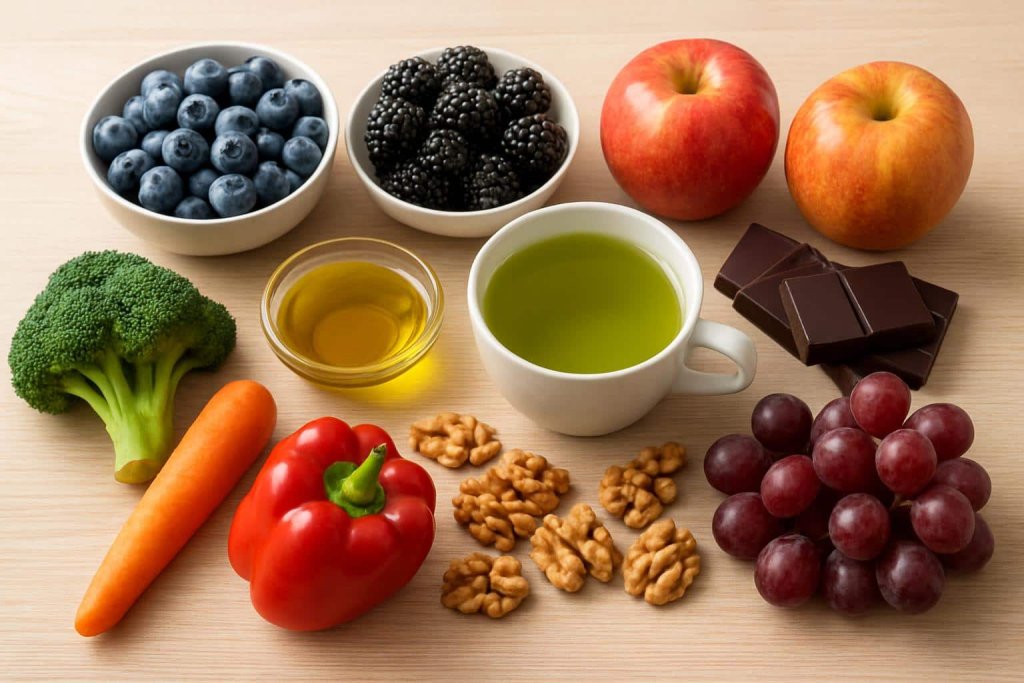
Most polyphenols come from everyday foods—berries, apples, dark chocolate, green tea, and vegetables—making them easy to incorporate into a balanced eating pattern. Research from institutions like the National Institutes of Health, Harvard T.H. Chan School of Public Health, and the European Food Safety Authority (EFSA) highlights how these compounds may support long-term health.
(See authoritative resources:
Harvard – Antioxidants Overview
NIH – Dietary Polyphenols Review)
What Are Polyphenols? (Overview, Food Sources and Nutrition Profile)
Polyphenols are naturally occurring plant compounds found in a wide variety of foods, including fruits, vegetables, herbs, spices, tea, coffee, cocoa, nuts, seeds, and whole grains. These compounds are widely recognized for their antioxidant and cell-supporting properties, which may help protect the body from oxidative stress and support overall wellness when consumed consistently through whole foods.
According to research summarized by the Harvard T.H. Chan School of Public Health, plant foods rich in antioxidants—including polyphenols—play an important role in long-term metabolic, cardiovascular, and cellular health. Although polyphenols are not classified as essential nutrients like vitamins or minerals, they contribute significantly to the nutritional quality and protective benefits of a plant-forward diet.
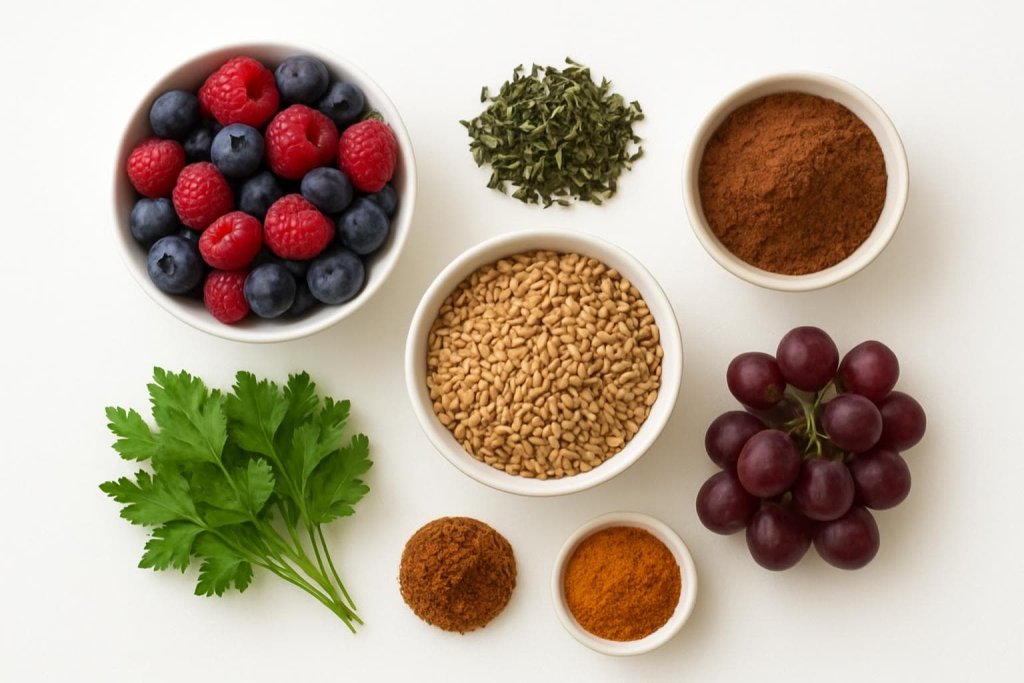
Major Categories of Polyphenols
Nutrition scientists generally classify polyphenols into four major groups based on their chemical structure and biological activity:
1. Flavonoids
Flavonoids are the largest and most studied polyphenol group. They are naturally abundant in:
- Berries (blueberries, strawberries, blackberries)
- Onions and leafy greens
- Tea (green, black, white)
- Citrus fruits
- Apples
Flavonoids include catechins, anthocyanins, flavonols, and flavones—each associated with antioxidant and inflammation-balancing properties. Tea flavonoids, for example, have been studied extensively for heart and metabolic support, as highlighted in the Harvard Nutrition Source – Tea.
2. Phenolic Acids
Phenolic acids are widespread in everyday foods and are known for their antioxidant potential. Common dietary sources include:
- Coffee and espresso
- Whole grains (brown rice, oats, barley)
- Berries and cherries
- Spices such as cloves and cinnamon
These compounds often work alongside fiber and other phytonutrients to support digestive and metabolic health. Coffee, in particular, is one of the richest sources of phenolic acids, as noted by the Harvard School of Public Health – Coffee and Health.
3. Stilbenes
Stilbenes are a smaller group of polyphenols but are notable for their presence in:
Resveratrol—one of the most well-known stilbenes—is associated with antioxidant and cell-protective mechanisms. Research summarized by the National Institutes of Health (NIH) continues to explore how plant stilbenes may support vascular and cellular health over time.
4. Lignans
Lignans are polyphenols found primarily in fiber-rich plant foods such as:
- Flaxseeds and flaxseed meal
- Sesame seeds
- Whole grains
- Legumes
Lignans interact with the gut microbiome, producing metabolites that may help support hormonal balance, digestive health, and overall metabolic wellness. Gut health guidance from the Cleveland Clinic emphasizes the importance of fiber- and polyphenol-rich foods for maintaining microbial diversity.
How Polyphenols Work in the Body
Although polyphenols vary widely in structure and biological activity, they share several important characteristics:
- Antioxidant Support: Polyphenols may help neutralize free radicals and support cellular defenses.
- Metabolic Balance: Certain polyphenols may help support healthy blood sugar and lipid metabolism.
- Gut Microbiome Interaction: Polyphenols interact with gut bacteria, producing beneficial metabolites that support digestive and immune health.
- Inflammation Balance: Many polyphenols may help maintain healthy inflammatory responses through their effects on oxidative pathways.
These mechanisms align with evidence from the NIH Office of Dietary Supplements, which highlights the importance of plant compounds in overall dietary quality and metabolic support.
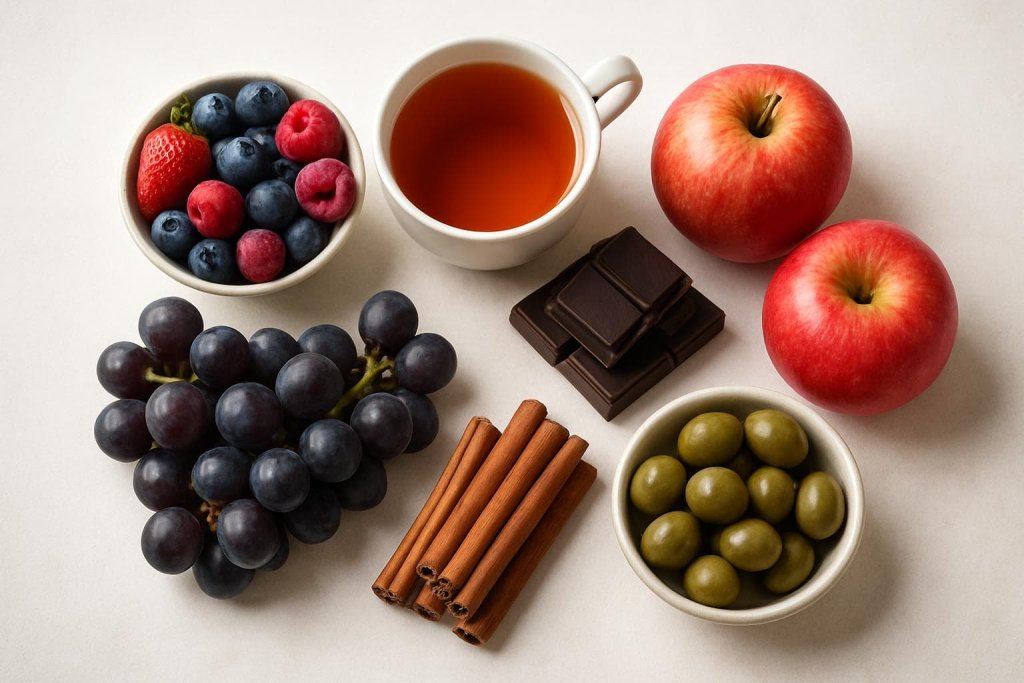
Food Sources of Polyphenols
Polyphenols are widely available in everyday foods, making them easy to incorporate into an overall healthy diet. Some of the richest sources include:
- Berries: Blueberries, strawberries, raspberries, blackberries
- Tea: Green, black, white, and oolong tea
- Cocoa and Dark Chocolate: Especially varieties with 70% cacao or higher
- Fruits: Apples, pears, plums, pomegranates, cherries, grapes
- Vegetables: Spinach, red onions, artichokes, broccoli, kale
- Herbs and Spices: Turmeric, cinnamon, oregano, rosemary, thyme
- Olive Oil: Extra-virgin olive oil (EVOO), a core component of the Mediterranean diet
- Nuts and Seeds: Flaxseeds, walnuts, almonds, sesame seeds
- Whole Grains: Oats, barley, brown rice, quinoa
Nutrient profiles for many of these foods can be verified through USDA FoodData Central, which provides detailed nutrition data.
Nutrition Profile of Polyphenol-Rich Foods
Although polyphenols are not “nutrients” in the same sense as vitamins or minerals, foods rich in polyphenols generally offer:
- Dietary fiber
- Vitamins (C, K, B-complex)
- Minerals (magnesium, potassium, manganese)
- Natural antioxidants
- Plant-based phytonutrients
These nutrients support overall health while polyphenols contribute additional biological activity that may help with inflammation balance, heart health, metabolic function, and gut health.
Harvard T.H. Chan School of Public Health highlights the role of plant-based diets rich in antioxidants and polyphenols in supporting long-term wellness and healthy aging.
Authoritative resource: Harvard Nutrition Source – Antioxidants
12 Science-Backed Polyphenols Benefits That May Support Better Health
Polyphenols are natural plant compounds found in foods like berries, tea, cocoa, and olive oil. Research shows they may support heart health, antioxidant defenses, metabolic balance, and overall wellness when consumed regularly as part of a plant-rich diet.
1. May Support Heart and Blood Vessel Health
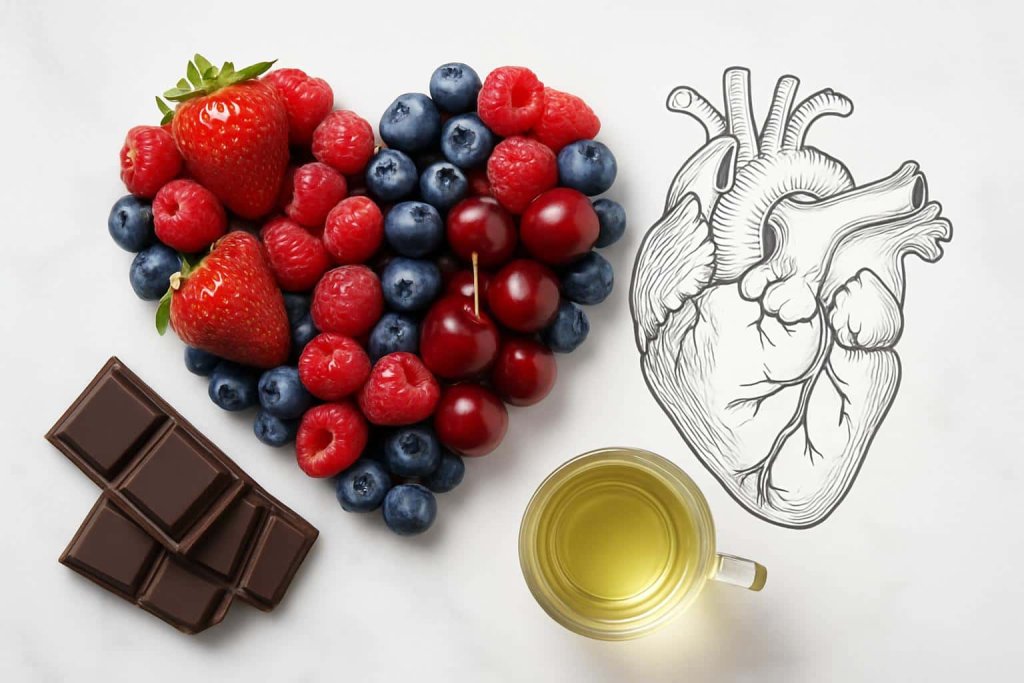
Polyphenols—especially flavonoids found in berries, cocoa, grapes, and tea—may help support healthy circulation by influencing nitric oxide pathways and helping maintain flexible blood vessels. Their antioxidant activity also supports protection against oxidative stress, a key factor in vascular health.
The American Heart Association explains that plant-rich diets support cardiovascular well-being through antioxidants and nutrient-dense foods.
Authoritative resource: American Heart Association – Plant-Based Nutrition
2. May Help Maintain Healthy Blood Pressure

Certain polyphenols, especially cocoa flavanols, have been studied for their ability to support endothelial function—the mechanism that helps blood vessels relax and maintain normal flow.
Scientific opinions from the European Food Safety Authority (EFSA) note that 200 mg of cocoa flavanols per day may help maintain normal blood vessel dilation, a key factor in healthy blood pressure.
Authoritative resource: EFSA Scientific Opinion on Cocoa Flavanols
3. Supports Healthy Cholesterol Balance
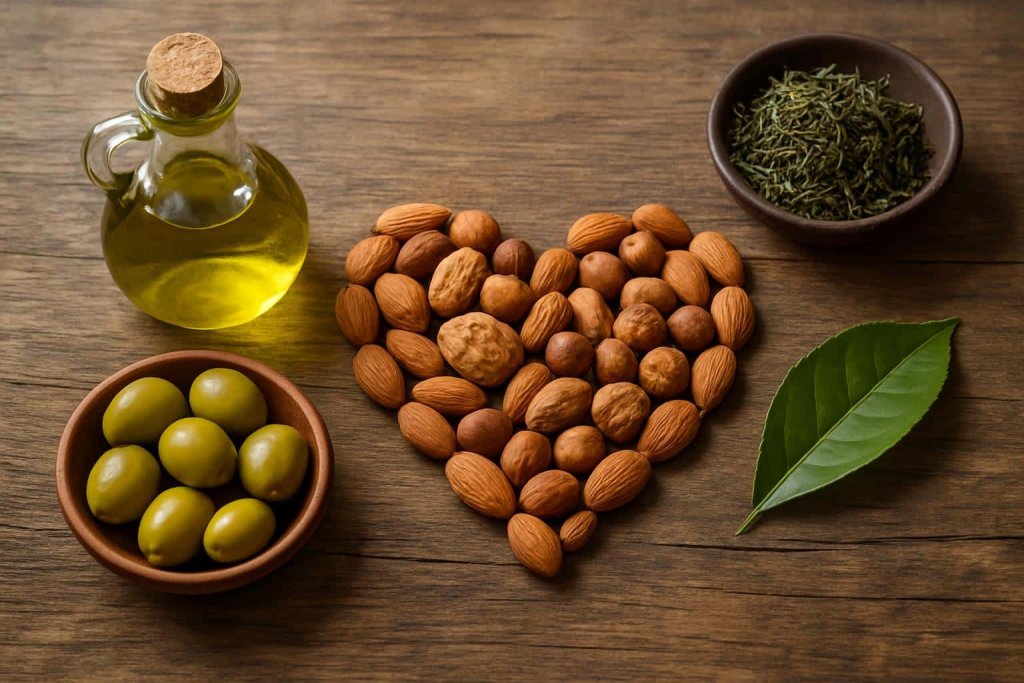
Plant polyphenols may help support antioxidant protection of LDL particles, which is important for overall heart health. Foods like extra-virgin olive oil, berries, nuts, and green tea are central in cardioprotective eating patterns such as the Mediterranean diet.
Research from Harvard T.H. Chan School of Public Health highlights how Mediterranean-style diets rich in plant foods support healthy cholesterol and cardiovascular wellness.
Authoritative resource: Harvard – Mediterranean Diet Overview
4. May Support Blood Sugar Control
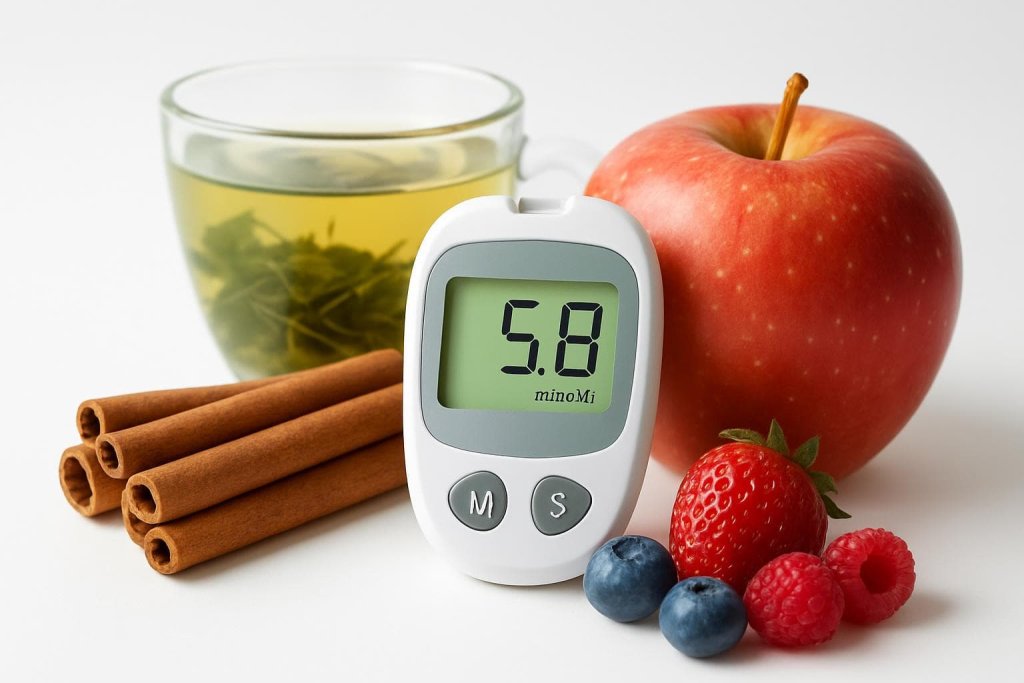
Polyphenols may help support healthy blood sugar levels by influencing how the body digests carbohydrates and responds to insulin. Research highlights compounds in green tea, berries, cinnamon, apples, and cocoa for their potential role in supporting post-meal glucose balance and metabolic health.
The Centers for Disease Control and Prevention (CDC) emphasizes that increasing intake of fruits, vegetables, whole grains, and other minimally processed plant foods is a key strategy for maintaining healthy blood sugar and reducing long-term diabetes risk. Their guidance from the CDC National Diabetes Prevention Program reinforces the importance of dietary patterns rich in fiber, antioxidants, and plant-based nutrients—many of which naturally contain polyphenols.
5. May Support Weight Management
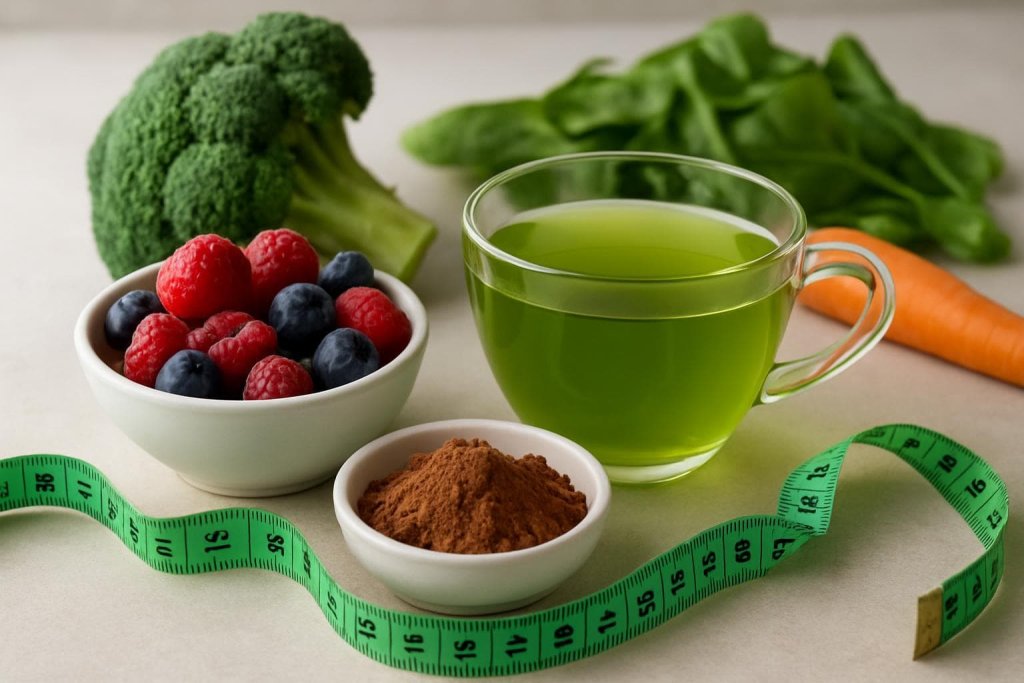
Polyphenol-rich foods may help support metabolic rate, appetite signals, and fat-oxidation pathways, especially when combined with regular physical activity and balanced meals.
Green tea catechins, berry anthocyanins, and cocoa flavanols are among the most researched compounds for their potential role in supporting healthy body composition.
Authoritative resource: NIH – Healthy Eating & Weight
6. Provides Antioxidant Support
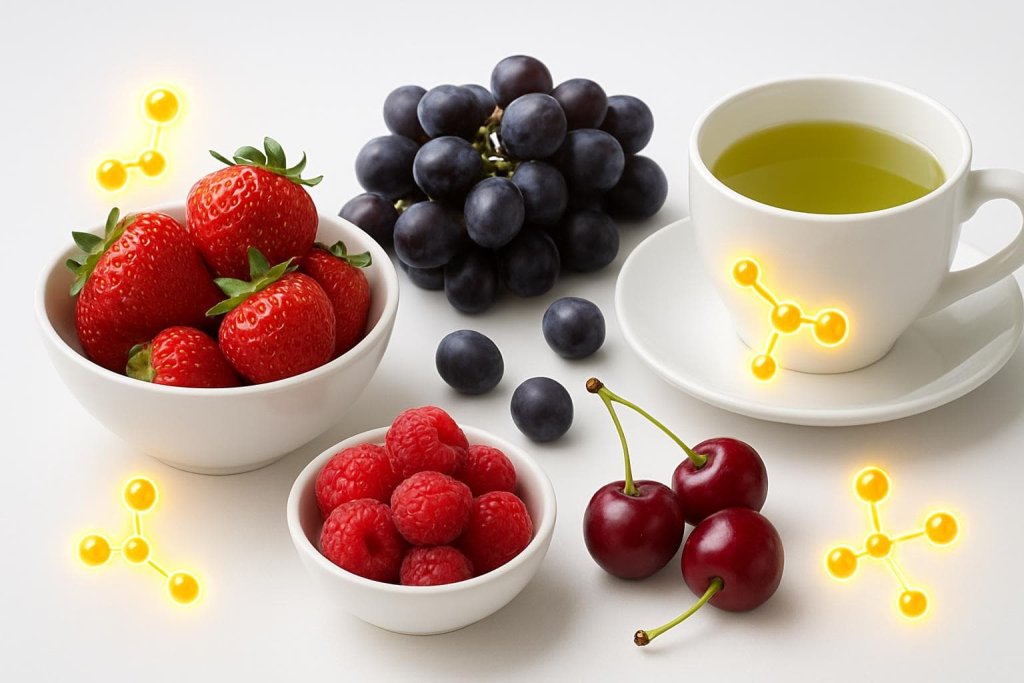
Polyphenols act as antioxidants and may help neutralize free radicals while supporting the body’s natural antioxidant pathways. This may help reduce oxidative stress—one of the contributors to aging and long-term health concerns.
Harvard’s Nutrition Source outlines how antioxidants from plant foods support cellular protection and overall wellness.
Authoritative resource: Harvard – Antioxidants Overview
7. May Help Reduce Low-Grade Inflammation
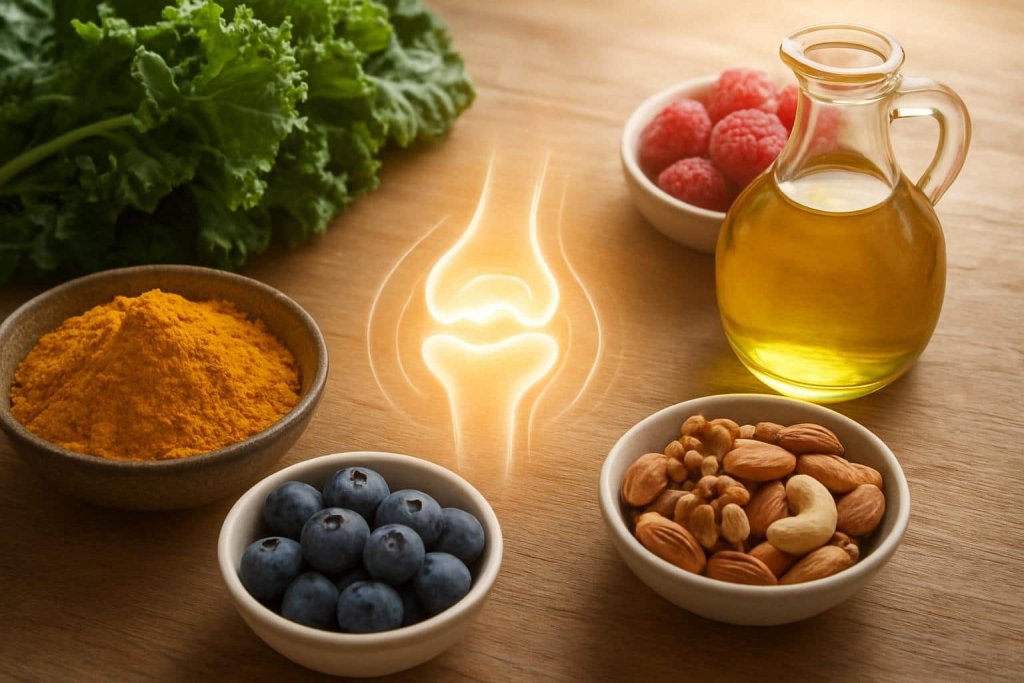
Chronic low-grade inflammation is linked to many long-term health issues. Polyphenols from foods like berries, olive oil, leafy greens, and turmeric may help support healthy inflammatory balance by influencing oxidative pathways and gut-immune interactions.
Authoritative resource: Harvard Health – Anti-Inflammatory Foods
8. May Support Brain and Cognitive Health
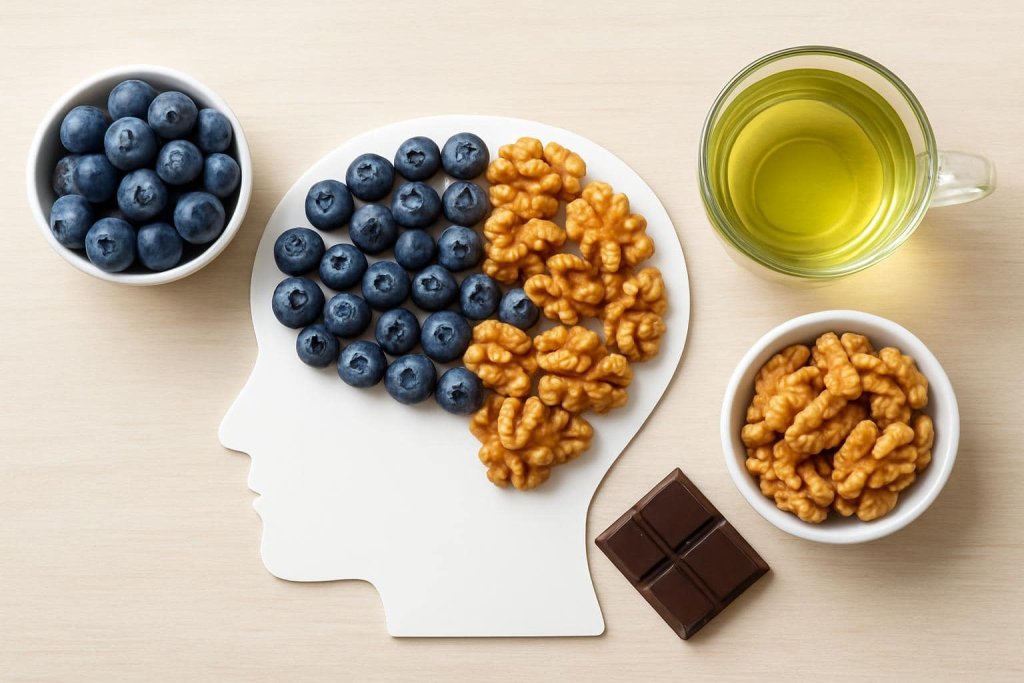
Long-term intake of polyphenol-rich foods—especially berries, green tea, grapes, and cocoa—has been linked with healthier cognitive aging. Their antioxidant and vascular benefits may help support memory, focus, and overall brain function.
The National Institute on Aging (NIA) highlights diet quality—including plant antioxidants—as an important factor influencing cognitive wellness.
Authoritative resource: NIH – Cognitive Health
9. Supports Gut Microbiome Health
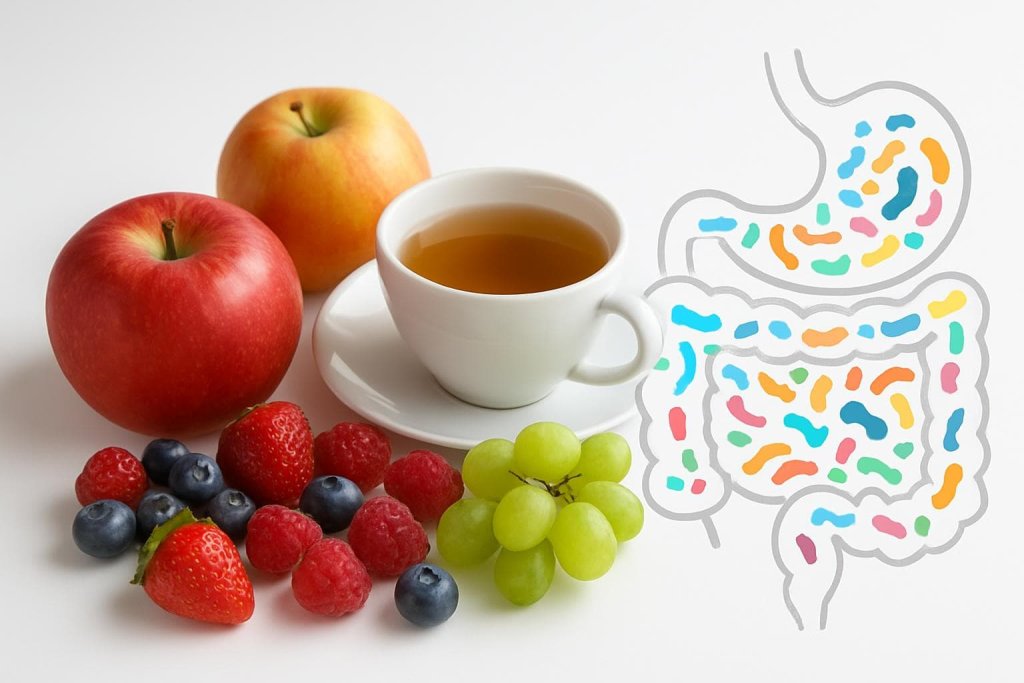
Polyphenols interact with the gut microbiome in a beneficial two-way relationship:
- Gut bacteria convert polyphenols into bioactive compounds.
- Polyphenols may support a healthy balance of gut microbes.
Foods like berries, apples, grapes, tea, and cocoa contain microbiome-supportive polyphenols that may contribute to digestive and immune health.
Authoritative resource: Cleveland Clinic – Gut Health
10. May Support Immune Function

Polyphenol-rich foods provide antioxidants and nutrients that collectively support immune defenses. Their influences on gut health and inflammatory balance also contribute to normal immune function.
Authoritative resource: Johns Hopkins Medicine – Immune Support
11. May Support Healthy Skin and Aging Markers
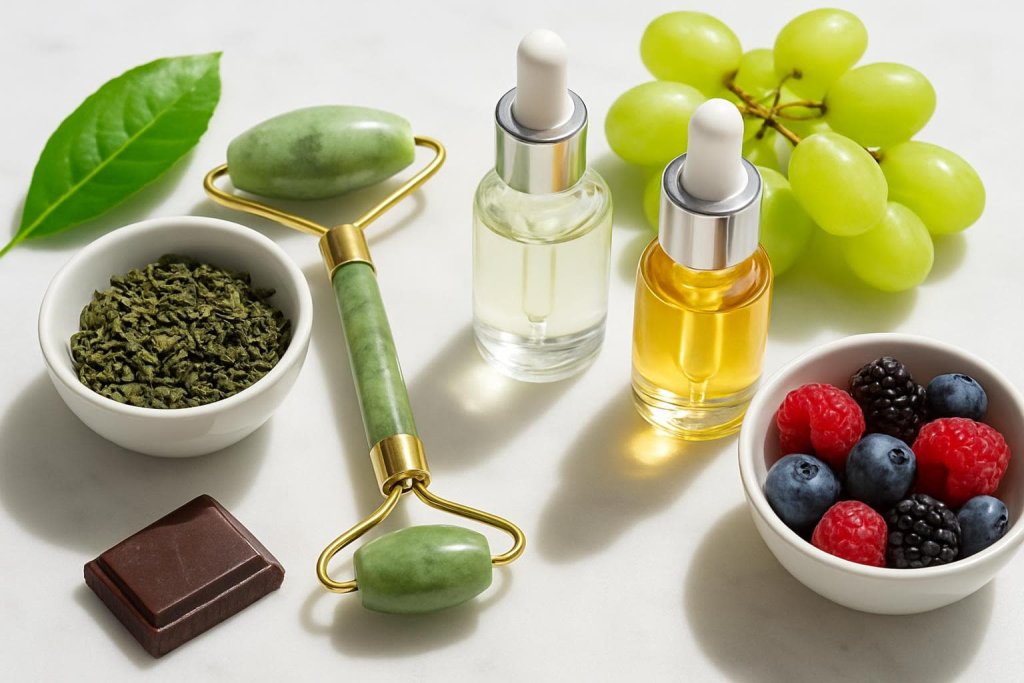
Polyphenols—especially those found in green tea, cocoa, berries, and grapes—may help support skin health by offering antioxidant protection against oxidative stress and environmental factors, including UV-related free radicals. These compounds may contribute to maintaining smoother-looking skin, supporting collagen integrity, and promoting overall skin resilience as part of a balanced diet.
The American Academy of Dermatology (AAD) explains that antioxidants play a meaningful role in everyday skin-aging prevention, helping protect the skin’s surface from environmental stressors and supporting a more youthful appearance. Their guidance highlights the value of incorporating antioxidant-rich foods and healthy lifestyle habits into long-term skin care routines.
Authoritative resource: American Academy of Dermatology – Anti-Aging Skin Care
12. May Support Longevity and Healthy Aging
Polyphenol-rich dietary patterns—such as the traditional Mediterranean and green Mediterranean diets—may support healthier aging by emphasizing whole plant foods, extra-virgin olive oil, nuts, legumes, vegetables, fruits, herbs, and whole grains. These eating patterns are naturally high in antioxidants and plant compounds that may help support cellular health, metabolic function, and long-term wellness.
Research summarized by Harvard Health Publishing shows that individuals who consistently follow plant-forward diets rich in fruits, vegetables, whole grains, and unsaturated fats have a higher likelihood of achieving “healthy aging” milestones later in life. These findings highlight the important role of nutrient-dense, polyphenol-rich foods in supporting longevity and age-related wellness.
Authoritative resource: Harvard Health – Diets Rich in Plant-Based Foods Linked to Healthy Aging
Possible Side Effects and Precautions
Although polyphenols from whole foods are generally considered safe for most healthy adults, certain precautions are important—especially for individuals with medical conditions or those considering supplements. Following these guidelines helps keep this information medically responsible.
Digestive Sensitivity
Some people may experience mild digestive discomfort—such as bloating, gas, or reflux—after consuming large amounts of polyphenol-rich foods like citrus, coffee, or spices. Individuals with sensitive stomachs or existing digestive conditions should increase intake gradually and monitor tolerance.
Medication Interactions
Certain polyphenol-rich foods and supplements may interact with medications:
- Blood thinners: Foods rich in flavonoids (e.g., green tea or certain extracts) may affect clotting pathways.
- Diabetes medications: High-dose polyphenol supplements may influence insulin sensitivity or blood sugar responses.
Individuals on prescription medications should speak with a healthcare provider before taking concentrated polyphenol supplements.
Authoritative resource: NIH Office of Dietary Supplements – Safety Guidance
Pregnancy & Breastfeeding Cautions
Pregnant or breastfeeding individuals should avoid high-dose polyphenol supplements unless recommended by their clinician. Whole foods remain the safest source during this period, as excessive intake of certain extracts may influence fetal development or nutrient absorption.
High-Dose Supplement Caution
Polyphenol supplements may deliver doses far higher than what is found in food. Excessive intake may lead to headaches, digestive issues, or nutrient-interaction effects. Long-term safety data for many concentrated extracts remains limited.
Food-First Approach
Health experts—including the Harvard T.H. Chan School of Public Health—emphasize that the safest and most effective way to consume polyphenols is through a diet rich in fruits, vegetables, nuts, whole grains, olive oil, tea, and cocoa.
How to Add Polyphenols Safely to Your Diet
Adding polyphenols to your daily routine can be simple, enjoyable, and safe when done through whole foods.
Serving Ideas
- Add berries to oatmeal or yogurt.
- Brew green or black tea instead of sugary drinks.
- Use extra-virgin olive oil for dressings or cooking.
- Add spices like cinnamon, turmeric, or oregano to meals.
- Enjoy dark chocolate (70% cacao or higher) in moderation.
Daily Intake Guidance (Food-Based)
There is no official daily requirement, but most studies showing benefits use intakes achievable by:
- 2 servings of fruit
- 2–3 servings of vegetables
- 1–2 cups of tea
- A small amount of cocoa or dark chocolate
- Regular use of herbs, spices, nuts, and olive oil
Best Combinations
Pairing polyphenol-rich foods with vitamin C sources—such as citrus, berries, or peppers—may help support antioxidant absorption and activity.
Who Should Be Cautious
- Individuals with GERD, acid reflux, kidney issues, or food allergies
- Those on blood thinners, diabetes medications, or blood pressure meds
- Pregnant or breastfeeding individuals (avoid high-dose supplements)
When in doubt, consult a healthcare professional.
Supplement Safety and What to Look For
For individuals who may consider polyphenol supplements, safety and quality should always come first.
Third-Party Testing
Choose supplements that are independently tested by credible organizations:
- USP (U.S. Pharmacopeia)
- NSF International
- ConsumerLab
These certifications help verify purity, potency, and safety.
Extract Potency Caution
Polyphenol extracts are much more concentrated than whole foods. Start with the lowest effective dose and avoid taking multiple polyphenol extracts simultaneously unless supervised by a clinician.
Avoid Mega-Doses
High doses may increase the risk of digestive upset, headaches, and medication interactions. Long-term safety for very large doses is not well established.
Food-First Emphasis
Experts from Harvard Health Publishing consistently recommend obtaining antioxidants and polyphenols through whole foods rather than supplements whenever possible.
Storage and Food Safety Tips
Proper storage helps preserve polyphenol content and prevents degradation from heat, light, or air.
Storing Tea
Keep green and black tea in an airtight container away from light and moisture to maintain antioxidant levels.
Storing Berries
Refrigerate fresh berries and consume within 2–4 days. Freeze surplus berries to preserve polyphenols long-term.
Spices and Herbs
Store dried spices in airtight containers away from heat. Replace every 6–12 months for maximum potency.
Cocoa & Dark Chocolate
Store cocoa powder in a cool, dry place. Keep dark chocolate away from direct sunlight to prevent oxidation.
Olive Oil
Extra-virgin olive oil should be stored in a dark, cool location. Exposure to heat and light decreases its polyphenol content.
Authoritative resource: UC Davis Olive Center – Olive Oil Storage
Frequently Asked Questions (FAQs)
1. What are polyphenols?
They are natural plant compounds with antioxidant properties that may support heart health, metabolism, and overall wellness.
2. Can I get enough polyphenols through food?
Yes—fruits, vegetables, tea, coffee, whole grains, nuts, and olive oil provide ample polyphenols.
3. Are polyphenol supplements necessary?
Most people can get sufficient polyphenols from food. Supplements are optional and should be used cautiously.
4. Do polyphenols help with weight management?
They may help support metabolic balance when combined with healthy eating and exercise.
5. Can polyphenols affect medications?
Yes, certain supplements may interact with blood thinners, diabetes medications, or blood pressure drugs.
6. Are polyphenols safe during pregnancy?
Whole foods are generally safe, but high-dose supplements should be avoided unless recommended by a clinician.
7. Which foods have the most polyphenols?
Berries, cocoa, tea, coffee, spices, olive oil, nuts, apples, and dark-colored fruits.
Conclusion
Polyphenols offer a wide range of potential wellness-supporting benefits, especially when consumed through a plant-rich diet. Adding more fruits, vegetables, herbs, teas, and natural plant foods to your meals is a simple way to support heart, metabolic, skin, and cognitive health. For most people, a food-first approach delivers the safest and most effective long-term benefits.
This content is for informational purposes only and not medical advice.
